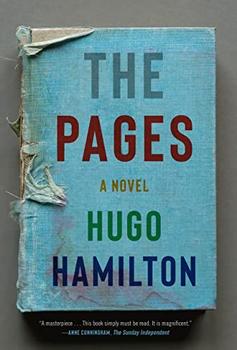Summary | Excerpt | Reviews | Beyond the Book | Readalikes | Genres & Themes | Author Bio

A novel
by Hugo HamiltonChapter | 1 |
Here I am, stored inside a piece of hand luggage, being carried through the departure lounge at JFK airport. The owner of the bag is a young woman by the name of Lena Knecht. She is getting on a flight to Europe. Bringing me home, so to speak. Back to Berlin, the city in which I was written. Where I was first printed by a small publishing house almost a hundred years ago, in 1924. Where I was rescued from the fire on the night of the book burning in May 1933. The city from which my author fled the day Hitler came to power.
My homeless author. My restless, refugee, itinerant, stateless writer on the run. Living out of a suitcase. Fleeing for his life.
His name—Joseph Roth.
The title—Rebellion.
I was born—
I came to life—between the wars. During the Weimar Republic—what they call the waiting room between the First World War and the Second World War. Between what was first thought to be the fields of honor and later became the fields of shame. A time of orphans and child poverty. Women running the cities while men were left behind on the battlefield. Defeated men who came back missing limbs and needed help to bring beer to their lips. Men with nightmares of decomposing hands emerging from the trenches. Cold winters they called God's fist sweeping across from the East. And hunger in the blank expression of a tram conductor munching on a box of chocolates left behind by a passenger after the cinema.
A time of hardship and glamour. A time of revolution. Emancipation, cabaret—love and art without rules.
Everybody was in a club. Everybody wanted to belong to groups and social federations—chess clubs, dancing clubs, dog-breeding clubs, stamp-collecting clubs, orchid-growing clubs. Women's fraternities. Gentlemen's fraternities. Hunting clubs. Drinking clubs. Laughing clubs. Prankster clubs in which members challenged each other to look stupid and eat too much, or reward a passing pedestrian for permission to pour a bottle of wine into the pocket of his trousers.
Everybody was in a league or a trade union. The League of Blinded Warriors. The Association of Newspaper Vendors. The Central Association of German Watchmakers. The League of German Butchers. The League of German Brewers. The League of German Canteen Leaseholders.
Everybody was against something. Everybody had a manifesto. Right and Left. A time of envy and grievance and clubs with closed membership. When a book was no longer safe. When Hitler was already busy plotting to eliminate me and my author, and his people.
What does time mean to a book?
A book has all the time in the world. My shelf life is infinite. My secondhand value is modest. Some devoted collector might pick me up for a few dollars on eBay and keep me like a species gone into extinction. Rebellion—I have been reprinted many times. Translated into many languages. Scholars can find me in most libraries. Twice I was turned into a movie.
But here I am in person, first edition, slightly bashed up and faded. Readable as ever. A short novel about a barrel organ player who lost his leg in the First World War. The cover image shows the silhouette figure of a man with a wooden leg raising his crutch in anger at his own shadow.
Lena, my present owner, has the habit of throwing things into her bag in a congested heap—passport, purse, mobile phone, makeup, medical things, a frayed toy duck she's had since childhood, along with a partially eaten pastry. Here I am, living in a dark sack with these fellow travelers, all hoping to be brought into the light of day when her blind hand comes diving down.
Mostly it's her phone she picks out. How can a book compete with such an intelligent piece of equipment? It contains her whole life. All her private details, her photographs, her passwords, her intimate messages. It knows her mind and shapes her decisions. It does everything a book used to do. It behaves like an unfinished novel, constantly in progress, guessing her worst fears and her wildest dreams.
Excerpted from The Pages by Hugo Hamilton. Copyright © 2022 by Hugo Hamilton. All rights reserved. No part of this excerpt may be reproduced or reprinted without permission in writing from the publisher.
There are two kinds of light - the glow that illuminates, and the glare that obscures.
Click Here to find out who said this, as well as discovering other famous literary quotes!
Your guide toexceptional books
BookBrowse seeks out and recommends the best in contemporary fiction and nonfiction—books that not only engage and entertain but also deepen our understanding of ourselves and the world around us.